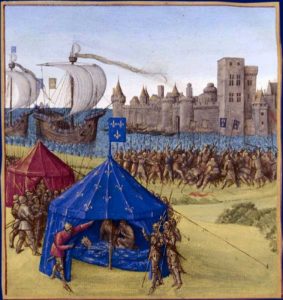1270
St Louis Dies on Crusade
Louis IX was one of the most remarkable of French kings and the only one to be considered a saint. His medieval reputation was enormous, spreading even to the New World with French explorers who named a settlement on the banks of the Mississippi after him.
Louis became king at the age of 12 upon the death of his father, Louis VIII. (Why French royal families are so unimaginative with their names is a mystery; there would be 18 kings named Louis and 10 named Charles. None would be named Gerry.) His deeply-religious mother Blanche of Castile served as regent until he came of age. Her piety and Catholic zeal also infused her son who vowed to live up to the title of “most Christian king”, a name attached to French rulers by the papacy. After his accession to full power in 1234, he decreed a number of laws against moral crimes such as usury, prostitution, and blasphemy and acted against his country’s Jews. Louis purchased a number of relics from the financially-strapped Byzantine emperor, including the Crown of Thorns and a piece of the True Cross, which he housed in the gloriously Gothic Sainte-Chappelle church which he commissioned. His charity was legendary; he washed the feet of beggars and established hospitals, leprosaria and asylums across France.
While his domestic policies were successful, Louis’ involvement in crusading was disastrous. In 1249 he launched the Seventh Crusade, attacking the Muslim strongholds of the Ayyubid dynasty in Egypt. His troops were successful on the coast in capturing the city of Damietta but their attempt to penetrate inland toward Cairo was thwarted at the Battle of Fariskur where Louis, his brothers and a host of French nobles were captured. After paying an enormous ransom, Louis was freed but he chose not to return to France. Instead he became a pilgrim, visiting holy sites in Jerusalem, and aiding the few remaining crusader holdings along the coast of the eastern Mediterranean. Undaunted by his failure in Egypt, Louis undertook the Eighth Crusade, this time targeted against Tunis. In 1270 his fleet landed at Carthage where his camp was soon swept by a plague of dysentery which carried off Louis and many of his men. His body was boiled and the bones and heart were sent back to France where he was interred among the tombs of his ancestors at St Denis.
Louis was canonized in 1297; he is the patron saint of Québec, St. Louis, New Orleans, and Versailles. He may be invoked by barbers, crusaders, kings, stone masons, parents of large families and those with difficult marriages.
